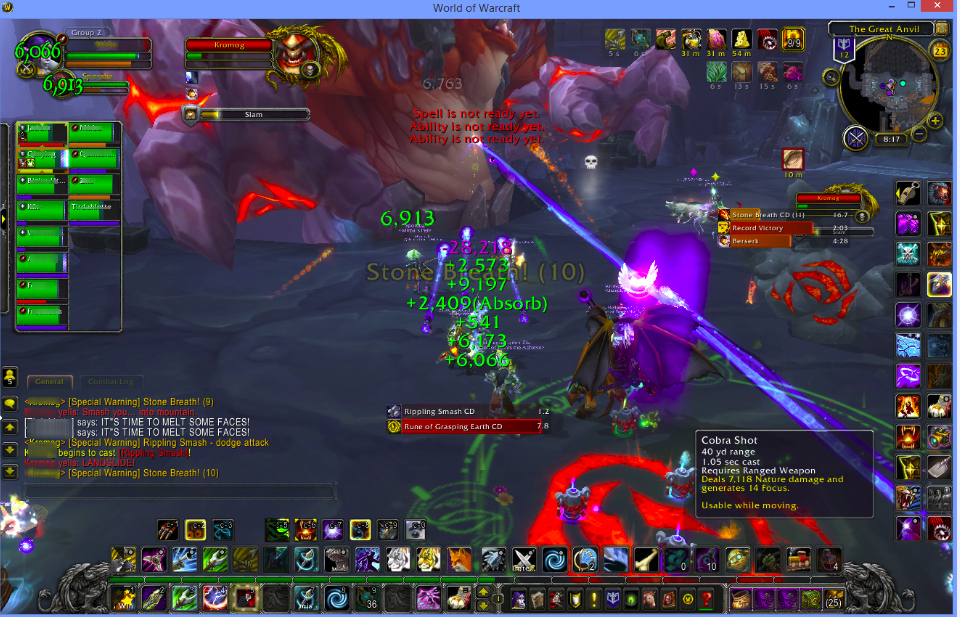World of Warcraft may not be the first place that business recruiters might look for new talent, but the massively multiplayer online role-playing game (MMORPG) teaches a lot of leadership lessons -- and enterprise leaders are taking note.
 |
| Live World of Warcraft game screen shows progress to defeating the boss, resources, player stats, in-game chat, map and more. |
Four out of 10 IBM employees said they’ve already “applied MMORPG leadership techniques and approaches to improve their leadership effectiveness at work,” according to a study by IBM and Seriousity 200 IBMers who were also gamers. Almost half said game-playing improved their business leadership capabilities.
USC and Deloitte’s John Seely Brown famously said, “I would rather hire a high-level World of Warcraft player than an MBA from Harvard.”
IBM and Brown are not alone in noticing how gaming cultivates business leadership.
My millennial daughter has been a raid leader for World of Warcraft (WOW) for 4 years. A raid is an in-game mission for a group of 10 or more of the almost 7 million game players worldwide to defeat monsters (known as “bosses”). Raids can last one or more hours, ending when the raid area is conquered.
She let me watch as she led a raid one evening. I was absolutely riveted – by the graphics, the non-stop action, the complex world and range of characters and creatures, listening to the play-by-play action and dynamics, marveling at her ability to understand what the heck was going on in those on-screen dashboards. I could completely understand how this would be an enthralling pastime.
But it dawned on me, as I listened for more than two hours, that something else very interesting and unexpected was going on.
A training ground for the modern business leader
 |
| WOW intersecting with real life – NYC cab crushed by a giant axe from one of the characters to promote the release of a new product. |
Here are the seven key skills that I believe WOW nurtures in players -- and makes them better leaders.
- Virtual teams and seamless collaboration. Raid leaders need their teams as much as their teams need them. And often no one in a virtual raid is in the same physical room -- in most cases not even the same city or state.
- Digital communication channels. Raid leaders and other players must be adept at working with simultaneous channels of communication, namely in-game typed chat and VOIP (live voice conversations during the game). The raid leader must juggle both of these at once for a successful outcome.
- Creating a Successful Team. Raid leaders cannot accomplish the mission without a mix of skills and experience in the raid group. They need to recruit the right mix of players ensuring a healthy overlap of expertise because they cannot rely on any given player always being available. They must constantly motivate their team. And they may even need to “fire” a player: “I’m sorry, Ruthless, but for this mission your equipment is not as good as we need. So how about tomorrow we run you through a few five-man dungeons to get better gear?”
- Motivating Volunteers. In addition to a love of play/challenge and social interaction, gamers want loot. By accomplishing their missions they can win gear (armor, etc.) that give them higher ratings. The raid leader often manages the distribution of the spoils and must maintain a fair and transparent method for assigning loot or risk alienating strong team members.
- Taking Risks and Continuous Improvement. The only way to succeed is to try and try again. Failure is always an option, but game players want to win. So before any raid she leads, my daughter researches how to win in each mission, e.g., which approaches work best. She checks out tip boards, YouTube videos, and more. Then she coaches the team on what is more likely to work. And if another player has more experience on a section, she allows them to lead strategy.
- Poise Under Pressure. At any moment, individual players -- or even the entire raid team -- can “die,” making for a volatile situation. Analysis of the situation must be real-time, relying on how well leaders can use the complex on-screen reporting. They must constantly readjust strategy, resources and actions.
- Visibility and Accountability. There are multiple ways you can see how each player is contributing to success. If someone is underperforming, the entire raid usually knows. This means no one -- including the Raid Leader -- can just coast along.
WOW and other MMORPGs offer tremendous leadership opportunities. Businesses can take advantage of leadership, technical and risk-taking skills that gaming has already developed in these individuals.
